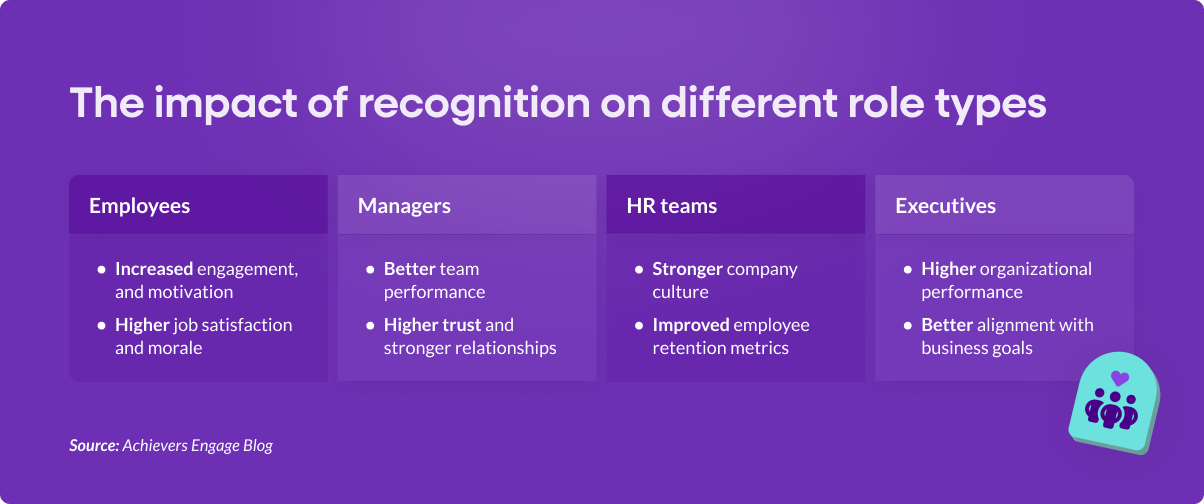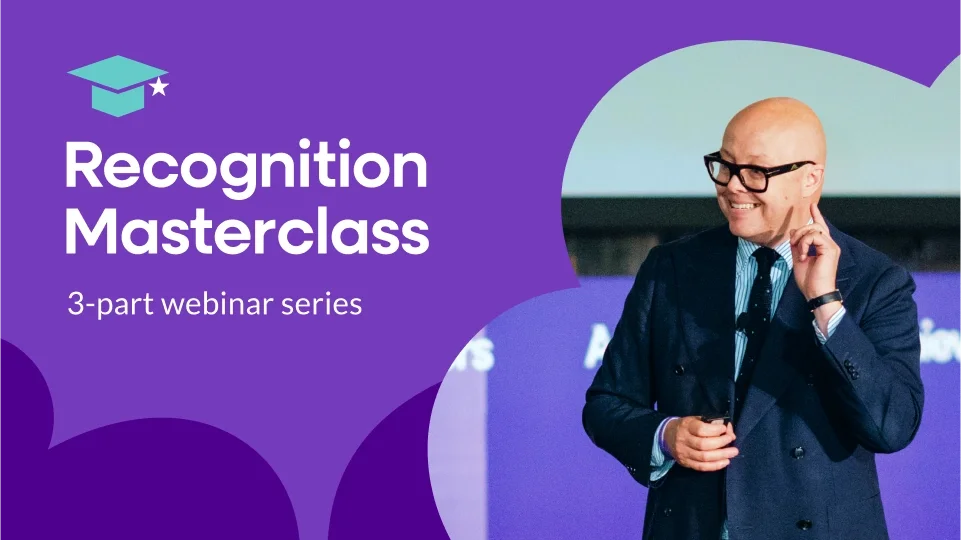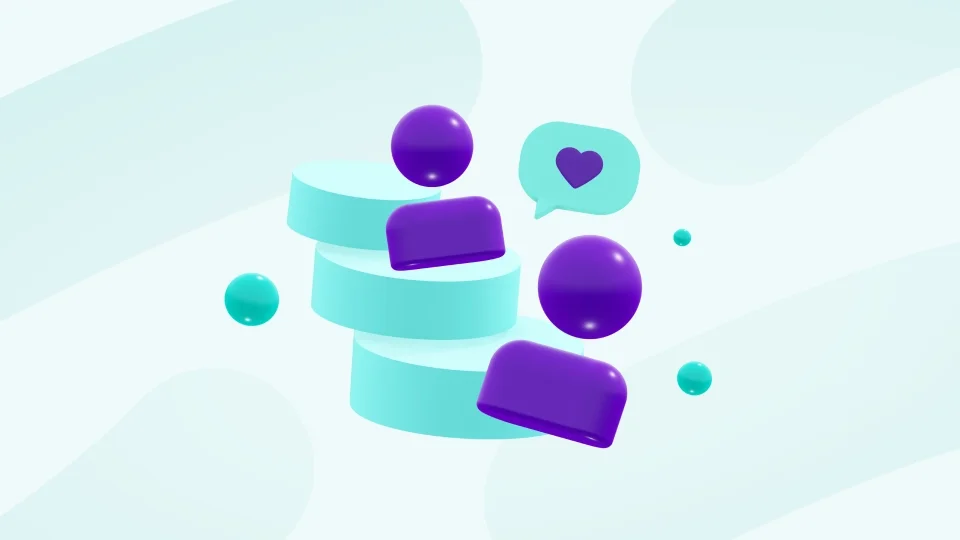Table of contents
Employee recognition is a powerful driver of morale, retention, and performance. Whether it’s celebrating a milestone, securing a big client, or exceeding goals, recognition reinforces the value of employees’ contributions.
At every level, recognition shapes workplace culture and productivity. For executives and HR professionals, it’s a cost-effective way to boost engagement and retention. For employees, it’s a way to feel more motivated when their efforts are appreciated. And managers? Recognition helps strengthen their leadership skills — a fact backed by a Gallup survey showing 28% of workers value recognition from their manager the most.
But what does this impact look like in action? Keep reading to explore how recognition benefits employees, managers, HR teams, and executives alike.

The impact of recognition on employees
Employee recognition plays a powerful role in making employees feel valued and committed to their workplaces. Implementing an effective employee recognition strategy will increase employee engagement, motivation, job satisfaction, and morale while reducing retention rates and increasing employee loyalty. Recognition is an investment in your people that comes with high returns. Here are just a few ways it can impact your employees:
Increased engagement and motivation
Recognition makes employees feel valued, seen and appreciated. Whether it comes from leadership, management, or their peers, people want to know their hard work is noticed. When employees do feel recognized and rewarded for their accomplishments, they’re going to feel more engaged and motivated. Building recognition into your workplace culture boosts productivity across the board.
PwC’s Global Workforce Hopes and Fears Survey 2024 found that leadership plays a key role in keeping employees engaged as their jobs change and the workplace evolves. While 26% of surveyed employees reported plans to leave their organization within the next year, recognition is a key factor driving engagement and employee retention, even as roles change.
Higher job satisfaction and morale
Employees who receive regular recognition for their work are happier with their roles. Recognition programs have widespread benefits. First and foremost, they make employees feel like they belong. They boost morale and improve job satisfaction. Peer-to-peer recognition builds stronger bonds between employees and more effective teams, while recognition from management and leadership improves employee-leadership relationships. Employees who feel like they belong are more likely to stay, with some research pointing to employees planning to stay three years longer than their less satisfied counterparts.
A recognition platform with rewards also factors in compensation-related satisfaction. Forbes found that 38% of HR leaders are focused on recognition and rewards programs to enhance retention and find innovative ways to broaden the total compensation package.
Stronger retention and loyalty
Companies that recognize their staff report stronger retention and more employee loyalty. Fulfillment is a major component of employee loyalty. People are more likely to stay committed to an organization when they have a sense of belonging, opportunities to grow, flexibility in the workplace, and recognition from their managers and colleagues.
Recognition is the foundation of building stronger workplace communities. Research shows that a strong sense of belonging results in a 43% increase in retention and an 84% increase in estimated tenure. Integrating recognition into everyday employee experiences can triple employees’ sense of belonging and loyalty.
Improved performance and collaboration
When people perform at their best, recognition makes it more likely that they’ll continue to pour that effort into their jobs. Positive reinforcement drives better teamwork and innovation. Teams thrive when their achievements are recognized, and they want to perform at their peak again and again.
Employee engagement is directly related to productivity and performance, especially in collaborative environments. However, with Gallup reporting that only 23% of employees feel engaged, there is considerable room for organizations to implement better recognition strategies to improve performance and collaboration.
The impact of recognition on managers
Integrating a recognition platform into your workflow gives managers and team leaders a secret weapon for creating a better company culture. A manager who effectively uses the power of recognition can unlock better team performance, build higher trust and stronger relationships, improve their own effectiveness, and make performance management simpler. Here are some of the ways recognition can impact managers:
Better team performance
Achievers’ 2024 State of Recognition Report found that increasing employee recognition from quarterly to monthly timelines can boost productivity by as much as 40%. Employees who feel recognized and appreciated perform better, helping your team rise to any challenge and making managers’ jobs easier.
An effective recognition platform uses a combination of praise and diverse rewards to motivate and improve engagement. When 90% of employees say that receiving recognition for their work motivates them to put in more effort, managers need to make the most of recognition platforms to increase acknowledgment. The positive feedback loop makes employees more willing to go above and beyond.
Higher trust and stronger relationships
Building trust in the workplace starts with managers and team leaders. Without high levels of trust, it becomes impossible for leadership to engage employees, retain top talent, and improve the employee experience. Efforts to motivate and engage can be met with skepticism when there isn’t trust in that working relationship.
Research from the Grossman Group found that employees in high-trust companies were 76% more engaged and 50% more productive. The payoff of building high-trust environments is clear. Managers can build stronger relationships by doing what they say, making themselves approachable, balancing the need for results with their employees’ well-being, and making recognition a core part of their management styles.
Improved leadership effectiveness
Managers who recognize employees with authenticity and regularity build their credibility and influence over their team. According to Achievers research, employees who would recommend their manager are four times more likely to be engaged at work than employees who wouldn’t.
The Achievers platform combines flexible recognition, budget certainty, and a global rewards marketplace that makes recognition more impactful. That helps managers forge better relationships with their teams, strengthen manager effectiveness, and empower them to foster more positive and productive workplaces.
Easier performance management
Effective managers are constantly balancing the need to produce results with their team’s emotions and feelings of belonging. Corrective action can jeopardize a team member’s productivity if they take that moment to disengage from the workplace, setting the stage for a future retention problem.
Regular recognition reduces the need for corrective action in the first place. Employee recognition creates a positive feedback loop that cultivates a drive to perform better, achieve more, and meet ambitious targets. Performance management is always easier with a team that strives to do well because they know their efforts won’t go unnoticed.
The impact of recognition on HR teams
Recognition is a critical opportunity for HR teams. HR leads the way in integrating employee recognition platforms, strengthening company culture, improving employee retention metrics, leveraging data-driven insights on employee engagement, and enhancing the company brand as a great employer. Recognition platforms are high-impact tools for HR teams looking to make major improvements. Here are a few ways HR teams are impacted by recognition:
Stronger company culture
Building an impactful recognition program strengthens your company culture. HR teams are leading the pack when it comes to shaping cultures of appreciation that attract top talent. Talented employees want to go to companies where high performers are recognized and rewarded. Incorporating recognition into a company’s values means that it prioritizes its people. HR teams that invest in recognition are supporting collaboration and innovation while turning their organizations into magnets for talented prospective employees. People pay attention when a company values them.
Improved employee retention metrics
Employees who are recognized for their hard work are six times more likely to remain at their jobs and the length of time they intend to stay in their role increases. Recognition goes hand-in-hand with retention, as acknowledgment and rewards create positive feedback loops for high performance and engagement. HR teams looking to improve their retention metrics will find a powerful solution in recognition programs.
Data-driven insights on engagement
Effective strategies start with meaningful insights. Recognition programs offer valuable analytics by providing HR teams with a real-time picture of employee sentiment.
By leveraging surveys, polls, and quizzes, organizations can measure key metrics like engagement, enthusiasm, sense of belonging, and trust in leadership. When employees have a voice, HR gains deeper insights into areas that need improvement. Data-driven decisions lead to smarter, more targeted solutions. Expanding your feedback tools ensures a clearer understanding of employee motivation, experience, and engagement.
Enhanced employer brand
A company’s employer brand is critical to its recruitment success. HR teams understand that recruitment isn’t just about matching the first person to the right role. The challenge of recruitment starts with an organization’s employer brand, long before a job opening is posted. Successful talent acquisition often means positioning your organization as the best choice among competing employers.
Successful recognition programs contribute to positive Glassdoor reviews. Glassdoor reviews are often the first resources prospective applicants turn to when they want to learn about a potential employer, with many job applicants relying on Glassdoor reviews for context before making any career decision.
The impact of recognition on executives
Executives are in a unique position to define company culture, inspire and motivate employees, and align their practices with their business goals. Leaders who recognize have a powerful impact on their workforce. Executives who embrace recognition set an example for everyone to engage, acknowledge, and reward great work. Here’s how recognition can impact executives:
Higher organizational performance
Companies with strong recognition programs are closely associated with improved profitability. The Incentive Research Foundation found that companies in the top quartile when it comes to successful recognition and rewards programs see 44% more profitability than employers in the bottom quartile.
Recognition programs that include verbal recognition, awards, and rewards for meeting performance measures and career milestones provide an important boost to engagement and productivity. Employees who feel recognized and appreciated by leadership are more engaged and anywhere from 17 to 26% more productive. That success is contingent on leadership embracing the power of recognition on performance across an organization.
Better alignment with business goals
Executives with a clear vision of their business goals need a way to bring employees into alignment. Recognition platforms are an effective tool for rewarding both personal achievements and key behaviors that drive success. Frequent and meaningful recognition can be a strategic tool for creating better alignment. It sends a clear message about the behaviors an organization expects and rewards, clearly defines your company’s core values, and cultivates employee understanding of the company’s goals.
By incorporating behaviors into recognition, leadership can better integrate core values across an organization.
Improved employee experience and culture
A culture of recognition boosts morale company-wide. High morale is the fuel that keeps successful organizations going. Employees are more engaged, hard-working, and likely to stay when they feel that they are regularly and meaningfully recognized. In one survey, 77% of employees stated that they feel like they work harder when they are better recognized by leadership, management, and peers. Creating that culture starts with leadership and can be sustained by an effective recognition program.
Stronger leadership reputation
Leadership reputation has important spin-off effects on retention and recruitment. Companies known for valuing their employees attract top talent and investors. Leadership reputation starts with trust between executives and employees. A report from Deloitte shows that companies with trusted leadership outperform their less-trusted peers by 400% and that employees are 1.5 times more likely to defend their employer after criticism, 1.5 more likely to positively review their employer on websites like Glassdoor, and 33% less likely to look for another job when they feel that leadership is transparent and honest.
The power of recognition at every level
Employee recognition matters at every level of an organization. Employees in an organization with a successful recognition program are more motivated and engaged, and they have higher levels of job satisfaction and morale. Structured recognition programs enable HR teams to build stronger employer brands, deliver more data-driven insights on engagement, and improve retention. Managers can use recognition programs to make performance measurement easier, build high-trust relationships with employees, and motivate their teams. At the top, executives can drive alignment with company values and achieve higher organizational performance across the board.
Implement a structured recognition program in your organization to capitalize on the benefits of employee recognition. Find out how the Achievers platform will enhance your organization’s recognition strategies. Points-based, flexible, and personalized recognition platforms are more likely to have the impact you need. With tools like the Achievers ROI calculator, you can measure precisely how recognition impacts your bottom line. Experience how recognition can improve performance at every level.



